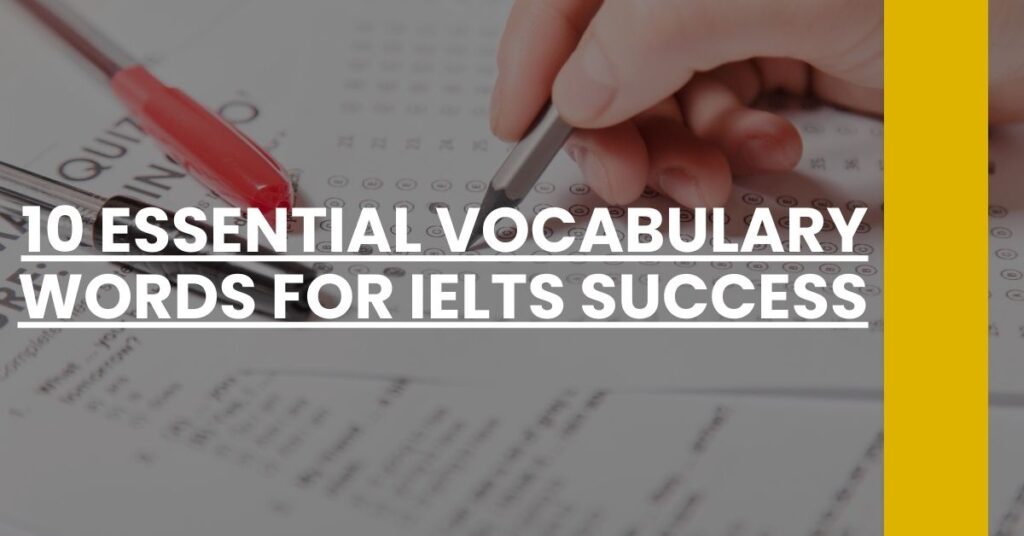Struggling to elevate your IELTS score? The secret might just be in your vocabulary.
This article zeroes in on vocabulary words for IELTS—the very building blocks that can transform your language proficiency and exam performance.
Discover tailored strategies and key words that can significantly elevate your IELTS results.
- 1. Core Vocabulary for Common IELTS Topics
- 2. Advanced Adjectives and Verbs to Impress Examiners
- 3. Understanding Idiomatic Expressions for Natural English
- 4. Navigating Synonyms for Nuanced Communication
- 5. Topic-specific Collocations to Enrich Answers
- 6. Strategic Phrasal Verbs for Dynamic Answers
- 7. Enhancing Listening Skills with Targeted Vocabulary
- 8. Practical Tips for Vocabulary Retention and Recall
- 9. Balancing Vocabulary Complexity with Clarity
- 10. Free Resources for Expanding Your IELTS Vocabulary
- Conclusion: Maximizing Your Vocabulary for IELTS Triumph
1. Core Vocabulary for Common IELTS Topics
When preparing for the IELTS, familiarizing yourself with the core vocabulary related to common themes can give you a significant advantage. It’s much like stocking your toolbox with the right tools before you need them. Here are essential vocabulary segments for key IELTS topics:
- Environment Vocabulary: Grasp words pertinent to climate change, sustainability, and conservation to articulate opinions on ecological matters. Renewable resources, biodiversity, and greenhouse gases are not just scientific concepts but pivotal parts of your lexical arsenal.
- Technology Vocabulary: It’s imperative to be conversant with terms like artificial intelligence, cybersecurity, and digital footprint as technology is a frequently broached subject in the IELTS landscape.
- Education Vocabulary: Understand how to discuss pedagogical approaches, literacy rates, and vocational training to express viewpoints on educational issues.
Explore comprehensive word lists tailored to these subject areas in resources like Lexicon for Environmental Insights or Digital Era Terminology Enhancements.
2. Advanced Adjectives and Verbs to Impress Examiners
Captivating your examiner with a variety of sophisticated adjectives and action verbs can be the key to a remarkable score. Let’s enrich your verbal palette:
- Elevate your descriptions with adjectives like ‘meticulous’ instead of ‘careful’ or ‘vivacious’ rather than ‘lively’.
- Power up your actions with verbs like ‘innovate’ rather than ‘change’ or ‘ameliorate’ instead of ‘improve’.
These linguistic variations not only provide nuance but demonstrate your command of English. For a catalog of adjectives that can skyrocket your IELTS performance, peruse resources like Enriching Your Adjective Usage.
3. Understanding Idiomatic Expressions for Natural English
Fluency in English isn’t limited to proper grammar and a hefty vocabulary. It also involves mastering idiomatic expressions for that touch of nativeness. Idioms can inject personality into your conversation and writing, but they’re a double-edged sword: use them correctly or not at all.
- Cutting Corners: Means taking shortcuts and reducing the quality or effectiveness of something.
- Hit the Books: Simply translates to studying hard or starting to study.
Understand when and how to use these expressions with guidance from Mastering IELTS Idioms.
4. Navigating Synonyms for Nuanced Communication
A nuanced communicator knows their synonyms. They’re your bridge to a more dynamic expression, for they allow you to avoid repetition and add depth to your discussions.
- First key idea: Words like ‘arduous’, ‘onerous’, and ‘laborious’ are all relatives in meaning but vary slightly, offering shades of complexity to the concept of ‘difficult’.
- Second key idea: The nuance between ‘happy’, ‘joyful’, and ‘elated’ can dramatically change the tone of your response.
Expand your synonym repertoire and unlock the gifts of nuanced communication through the Synonym Spectrum.
5. Topic-specific Collocations to Enrich Answers
You’ve probably heard the term ‘collocation’, but how does it apply to IELTS success? Topic-specific collocations are word pairs or combos that naturally go together and sound ‘right’ to native speakers.
- Environmentally-friendly packaging: An example when discussing sustainability.
- Breakthrough technology: Use this when illustrating advances in science and tech.
In essence, these collocations are pre-fabricated building blocks for your IELTS responses. For a closer look at making these a part of your vocabulary, consider exploring Thematic Collocations for Clarity.
6. Strategic Phrasal Verbs for Dynamic Answers
Cleverly incorporating phrasal verbs into your speech signals a versatile grasp of English, which is exactly what your IELTS examiners are on the lookout for. While these tricky verb + preposition/adverb combos might seem daunting, they are fundamental in showcasing fluency. Here are some strategic phrasal verbs that can vitalize your exam responses:
- Come across (meaning: to be perceived as): This verb can demonstrate your ability to describe an impression professionally.
- Catch up on (meaning: to bring oneself up to date): Ideal when discussing recent advancements or news.
To fluidly weave these into your dialogue for IELTS success, peruse the Essential Phrasal Verbs Compilation, which handpicks verbs that resonate with dynamic English usage.
7. Enhancing Listening Skills with Targeted Vocabulary
Undoubtedly, a splendid IELTS Listening score is within reach when your ears are attuned to the vocabulary words for IELTS that frequently echo in the audio clips. The key to acing this section lies not just in understanding the spoken words but in anticipating them.
- Homonyms: Words that sound alike but have different meanings, like ‘urgent’ vs. ’emergent’, can be commonly heard traps to watch out for.
- Phonetic Pitfalls: Words that pose pronunciation challenges, such as ‘literature’ or ‘thorough’, reveal themselves often in the Listening section.
By frequently listening to recordings and podcasts on IELTS-centric High-Frequency Lists, you’ll prime your auditory skills for the nuances of English pronunciation.
8. Practical Tips for Vocabulary Retention and Recall
Remember, amassing an impressive vocabulary is less about the accumulation of words and more about the ability to retrieve them when you most need them. Here are strategies to enhance your retention and recall:
- Active Usage: Implement new words in daily conversations or writing exercises; the journey from passive recognition to active utilization is critical.
- Spaced Repetition: Schedule reviews of your vocabulary at increasing intervals—this technique embeds words deep within your long-term memory.
- Mnemonics: Create vivid associations or stories with new words to improve memory retention, making recalling during the exam more intuitive.
Explore various linguistic retention methodologies and settle on one that resonates with you through resources like Memorization Strategy Insights.
9. Balancing Vocabulary Complexity with Clarity
When armed with an arsenal of vocabulary words for IELTS, it’s tempting to display every word you know. However, it’s the artful balance between vocabulary complexity and clarity that will truly impress.
- Use appropriate context: Big words are great, but they’re even better when used in the right scenario.
- Never sacrifice clarity for complexity: If a simpler word conveys your idea more clearly, it’s the superior choice.
Lastly, remember that effective communication trumps elaborate language. To navigate this balance, check out the Guide to Vocabulary Versatility, which helps clarify when and how to utilize complex vocabulary effectively.
10. Free Resources for Expanding Your IELTS Vocabulary
Honing your IELTS vocabulary doesn’t have to cost a dime. There’s a treasure trove of free resources ready to propel your lexicon to lofty heights.
- IELTS Vocabulary Builders: Provides a multitude of vocab-rich platforms that don’t cost a penny.
- Flashcard Favorites: Utilize flashcards for memory-enhancement techniques to assist with the rapid recall of challenging terms.
Conclusion: Maximizing Your Vocabulary for IELTS Triumph
In drawing this together, realize that diligently refining your vocabulary is a commitment that extends beyond learning—you need to nurture a vibrant relationship with words. They are, after all, your allies in expressing your ideas with precision and perceiving the world with greater nuance.
The road to IELTS triumph is paved with the bricks of lexical mastery, so delight in each new term you learn, employ these strategies, and let your results reflect the richness of language you’ve embraced.
Discover essential vocabulary words for IELTS preparation to boost your score with targeted study guides and expert tips.

